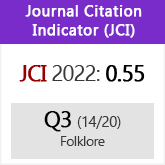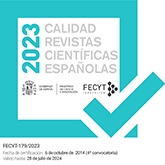De la voz a la letra: Problemas lingüísticos en la transcripción de los relatos orales. I: La puntuación
DOI:
https://doi.org/10.3989/rdtp.1997.v52.i1.346Abstract
The editor of oral narratives must face certains problems when turning what was originally oral discourse into a wrítten text. The original narrative changes its nature and function as a result of this transformation: the individual word, the performing act, language with a specific social function —playful expressiveness, as well as living and creative preservation of myths, archetypes and tradition— becomes writing, that is, language with no voice, intended for individual reading, and endowed with a different, although no less important, function as a learned and enduring witness to those myths, archetypes and tradition. If writing is a system which attempts to represent language, does the punctuation in the transcription of the oral really represent the narrator's prose, or, on the contrary, is this punctuation exclusively the editor's contribution, narrative thus creating a new written version? In this article, the author examines the punctuation guidelines adopted by different editors of traditional Hispanic ballads —romances in Spanish— in their search for the most faithful rendering of the oral narrative.
Downloads
Download data is not yet available.
Downloads
Published
1997-06-30
How to Cite
Trapero, M., & Llamas Pombo, E. (1997). De la voz a la letra: Problemas lingüísticos en la transcripción de los relatos orales. I: La puntuación. Disparidades. Revista De Antropología, 52(1), 19–46. https://doi.org/10.3989/rdtp.1997.v52.i1.346
Issue
Section
Articles
License
Copyright (c) 1997 Consejo Superior de Investigaciones Científicas (CSIC)

This work is licensed under a Creative Commons Attribution 4.0 International License.
© CSIC. Manuscripts published in both the printed and online versions of this Journal are the property of Consejo Superior de Investigaciones Científicas, and quoting this source is a requirement for any partial or full reproduction.All contents of this electronic edition, except where otherwise noted, are distributed under a “Creative Commons Attribution 4.0 International” (CC BY 4.0) License. You may read here the basic information and the legal text of the license. The indication of the CC BY 4.0 License must be expressly stated in this way when necessary.
Self-archiving in repositories, personal webpages or similar, of any version other than the published by the Editor, is not allowed.















